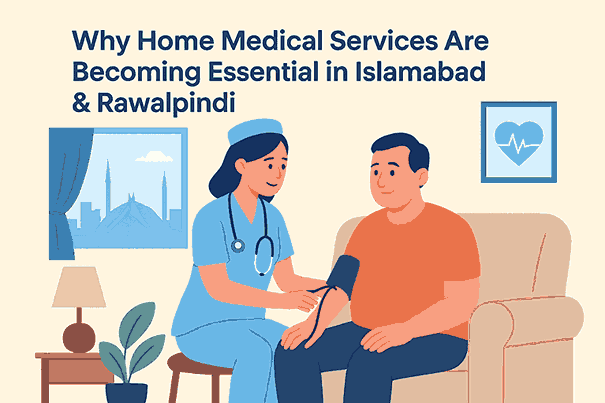Introduction
Over the past decade, Islamabad and Rawalpindi have grown rapidly—not just in population and infrastructure but also in the complexity of residents’ lives. With rising traffic congestion, a growing prevalence of chronic conditions, and hospitals stretched to their limits, many people are finding traditional hospital-based care increasingly difficult. This has led to a surge in the demand for home medical services—from nursing, physiotherapy, lab work, to diagnostics—offered at home or near-home. In this article, we’ll explore why, in the twin cities, home medical services are becoming essential.
1. Rapid Urbanization & Lifestyle Changes
Population Growth & Urban Sprawl
Islamabad has experienced significant urban migration. Many suburbs and housing societies are being built on the outskirts, increasing travel times to central hospitals. Dawn
As people settle further from hospital hubs, access to healthcare becomes more difficult, especially for the elderly or those with mobility issues.
Rise in Chronic Diseases & Aging Population
There is a noticeable increase in conditions like diabetes, hypertension, heart disease, etc. These require frequent monitoring, follow-ups, and sometimes complex in-home care.
Lifestyle changes—sedentary work, changes in diet, stress, less physical activity—are contributing to non-communicable diseases. Business Recorder
As people live longer, many need ongoing care rather than just episodic treatment, making home care more practical and comfortable.
Preference for Convenience & Personalized Care
With busy schedules (working professionals, long commuting hours, etc.), the convenience of having medical services come to you is highly attractive.
Being treated in a familiar home environment can reduce stress and risk of hospital-acquired infections.
2. Traffic & Transport Barriers
Heavy Traffic Congestion
Islamabad & Rawalpindi frequently suffer from traffic jams caused by road closures, security measures, and daily commuter loads. These make reaching hospitals on time a challenge. Dawn
For urgent or follow-up medical visits, travel delays can worsen conditions or lead to missed appointments.
Ambulance & Emergency Access Issues
There are reported cases of ambulances being stuck in traffic near major hospitals like PIMS. Trends News Line
Road blockades or protest-related closures have also prevented patients from reaching hospitals. The News International
Poor Transport Infrastructure & Lack of Alternatives
Public transport and last-mile connectivity often are inadequate for medical emergencies or for patients needing frequent visits.
For elderly, disabled, or severely ill patients, the effort, time, and discomfort of traveling far outweigh convenience.
3. Hospital Overload & Capacity Constraints
Overcrowded Hospitals & Long Wait Times
Major hospitals in Islamabad are under continuous strain. For example, PIMS and Polyclinic have been reported to be at or near saturation points. Dawn
Outpatient departments (OPDs) see huge daily patient flow; emergency departments often suffer from lack of immediate beds. Dawn
Limitations in Infrastructure Expansion
Despite population growth, there have been reports that few new hospitals have been constructed in Islamabad in recent decades. This means existing ones are stretching to serve more people without a proportional increase in capacity. Dawn
During crises (like pandemics, outbreaks, or mass emergencies), hospitals get overwhelmed, making home-based care a safer and less burdened alternative.
Cost & Risk Factors
Hospital stays are expensive, especially private ones; even in public hospitals, indirect costs (transport, time off work, etc.) add up.
Risk of infections, especially for immunocompromised or elderly patients, is higher in hospital settings.
4. How Home Medical Services Respond to These Challenges
Accessibility & Time-Efficiency
Home medical services reduce or eliminate travel time, waiting time, and stress. Patients can receive care at home at scheduled times.
For routine monitoring (like blood sugar, blood pressure, physiotherapy), home visits ease the burden on both patient and caregiver.
Flexibility & Personalization
Care plans can be tailored to the patient’s needs, frequency, and comfort level.
Care in the home can incorporate family support, familiar environment, which improves compliance and emotional wellbeing.
Lower Strain on Hospitals
By diverting non-urgent or follow-up care to homes, hospitals can focus on critical and emergency cases.
This helps reduce OPD crowding, shorter wait times, better resource allocation.
Technological Aids & Telemedicine
Virtual hospital platforms are emerging in the twin cities, allowing consultations, monitoring, and coordination to happen remotely. Pakistan Observer
Home lab sample collection, home medicine delivery, home-nursing services are increasingly available. Organizations like IHS, eShifa, etc., are offering these services. eShifa
5. Barriers & Considerations
While home medical services are increasingly essential, there are a few challenges to handle:
- Quality & Regulation: Ensuring trained personnel, good equipment, reliable standards.
- Cost & Insurance Coverage: Home services may not always be covered by insurance; out-of-pocket cost could be high.
- Awareness & Trust: Some patients may still prefer hospital care out of habit or due to mistrust of services at home.
- Logistics: For example, availability of diagnostic tools at home, supply of medicines, coordinating specialist visits.
- Security & Infrastructure: In some remote or underserved areas, access by service providers might be difficult.
6. Case Studies & Local Examples
- IHS (Islamabad, Rawalpindi, etc.): Offers a full range of home medical care—doctors, nurses, paramedics, lab sample collection, home-based medical equipment. ihspakistan.com
- eShifa Home Health Services: Tele-clinics, home medicine delivery, home-nursing, physiotherapy etc. in Islamabad & Lahore. eShifa
- Astramedic Solutions: Providing home nursing, diagnostics, and other home health services in Islamabad / Rawalpindi. astramedicsolutions.com
- Bluebird Home Medical Services: Offers a full range of home medical care – doctors, nurses, paramedics, lab sample collection, elderly care, physiotherapy in Islamabad / Rawalpindi. bbhms.com
These show that there’s already a working ecosystem, though still growing, for reliable home medical services in the twin cities.
7. Future Outlook & Recommendations
What to Expect
- Continued growth in demand for home medical services as cities become more congested and populations age.
- More tech adoption (telehealth, remote monitoring, IoT tools).
- Expansion of home services beyond just basic care to include specialized care (oncology, rehab, etc.).
What Providers Should Focus On
- Ensuring high standards: trained staff, hygiene, medical protocols.
- Transparency in pricing.
- Building trust through testimonials, certifications, and reliable service.
- Integrating with hospitals and clinics (referrals, shared data) to provide continuity of care.
- Using technology: apps, scheduling, remote monitoring to scale efficiently.
What Government & Policymakers Can Do
- Create regulatory frameworks to license and monitor home medical service providers.
- Subsidies or incentives / insurance cover-ups for in-home care, especially for vulnerable populations.
- Improve traffic management, emergency routing, ambulance lanes, to ease access to hospitals.
- Support public awareness campaigns to inform citizens about home care options.
Conclusion
In Islamabad and Rawalpindi, several converging trends—urban sprawl, lifestyle shifts toward less active living, increasing chronic disease prevalence, traffic congestion, hospital overcrowding—have made it harder for many people to rely solely on traditional hospital-based care. Home medical services are not just a luxury; in many cases, they are becoming essential. They offer access, comfort, efficiency, and a more humane alternative.
By embracing high-quality home medical care, both patients and the healthcare system can benefit—patients with more timely, personalized, and comfortable care; healthcare facilities with reduced strain and better allocation of resources.
If you’re considering home medical services for yourself or a loved one, look for reputable providers, review their credentials, and choose services that suit your health needs and lifestyle.
You can also take Bluebird Services which we highly recommend (They provide full range of home nursing and medical services in Islamabad & Rawalpindi.”)
Or Contact them here for Booking.
Keywords:
home medical services in Islamabad
home medical services in Rawalpindi
home healthcare Islamabad
home nursing services Islamabad
doctor at home Rawalpindi
physiotherapy at home Islamabad
home lab test collection Islamabad



